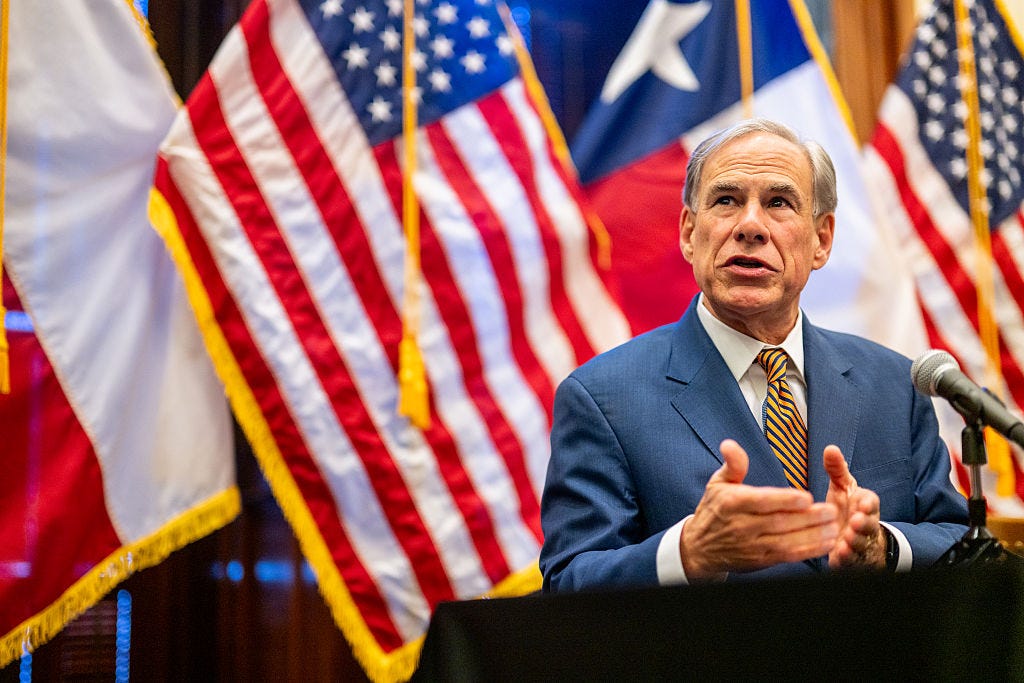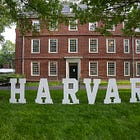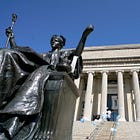Trump’s War on Universities
Under the new regime, every student becomes a possible enemy.
This article is brought to you by American Purpose, the magazine and community founded by Francis Fukuyama in 2020, which is now proudly part of the Persuasion family.
We can’t say they didn’t warn us. Back in 2021, JD Vance boldly asserted that “universities are the enemy” and promised to “honestly and aggressively attack the universities in this country.” Now that a multipronged assault on higher education has unfolded during the first few months of the second Trump administration, it is worth stepping back and taking stock of how the campaign is going.
The attack has proceeded using three sets of tools: the formidable powers of the federal government, state legislative power, and perhaps most disturbingly, the mobilization of society itself to undermine the classroom.
Start with the federal government. The biggest structural blow to research universities has been the major cutbacks in funding for scientific research and for government-funded medical care provided by many university hospitals. Funding and staff cuts have crippled the National Institutes of Health, the National Science Foundation, and the National Endowment for the Humanities, as well as other sources of federal research. The mechanism has been a combination of sequestering appropriated funds and reduced budgets in the One Big Beautiful Bill. It is not clear that these funds will ever return.
This marks the broader unraveling of the postwar bargain between government and universities, in which government would outline broad priorities for research conducted by university faculty on a competitive basis. The model produced the greatest university system in the world, and countless scientific discoveries. But it always carried the risk of government strings. (This was foreseen by early observers, such as University of Chicago President Robert Maynard Hutchins, who criticized the G.I. Bill after World War II on the grounds that government funds would diminish the autonomy of universities.)
Another set of tools being wielded by the Trump administration are the investigative powers granted under federal anti-discrimination law. Before Trump, prior administrations had deployed veiled threats to cajole universities into adopting favored policies. The Obama administration, for example, used a technically non-binding “Dear Colleague” letter to push universities into setting up large and sometimes overzealous bureaucracies to combat sex discrimination and sexual harassment. (The use of “Dear Colleague” letters by Obama and Biden, and their reprise in the Trump administration, was discussed by Shep Melnick in a recent article in these pages.) The Trump administration has now gone further and faster, most notably in the headline-making attacks on Ivy League universities. Weaponizing anti-discrimination law under Title VI of the Civil Rights Act, the administration withheld money from universities that was due under existing grants and contracts. While Title VI does allow withholding of funds, this requires an extensive set of procedures that the government did not follow. Threatened with existential funding cuts, several universities agreed to settlements on issues ranging from DEI policies, admissions, eliminating trans women’s participation in sports, and fighting antisemitism. (The Trump administration also issued a “Dear Colleague” letter of its own, prohibiting the use of federal work-study funds to support voter registration and other activities.)
The most intrusive settlement to date was that of July this year with Columbia University, which had been particularly hard hit by its bungled response to Palestine-related demonstrations. It was the two-faced testimony of President Minouche Shafik before Congress in April 2024 that had escalated those protests and triggered a round of encampments at American universities. This summer’s settlement included changes to admissions policies, increasing supervision over the Middle Eastern studies department, reducing the role of foreign students in Columbia’s “business model,” and a $200 million fine to the federal government. The university also has to pay for a third-party monitor to verify its compliance with the agreement. The settlement marked a major win for the Trump administration.
Perhaps in reaction to the bad press Columbia received, other universities in the crosshairs took different tacks. Instead of paying a fine to the federal government, Brown university paid $50 million into a community development fund, something that looked positively benevolent in comparison. But in addition to dismantling DEI initiatives, Brown was forced to reach out specially to recruit Jewish students. The University of Pennsylvania settlement focused primarily on the issue of transgender individuals participating in women’s sports, and required the school to strip school records from trans swimmer Lia Thomas. Penn was required to issue apologies to other swimmers that had lost to Thomas, and to take away her medals, but it did not materially suffer in the same way as the other schools. UCLA, Northwestern and other schools continue to be under investigation for antisemitism, with prospective fines and withheld funds reaching into the billions. Meanwhile, the presidents of Northwestern and the University of Virginia resigned under pressure.
Harvard, of course, is the biggest prize. When the administration demanded that the university appoint conservatives in the name of “viewpoint diversity,” Harvard pushed back, and was buoyed by a victory in September in which a federal judge ordered the restoration of research funds that had been withheld improperly. Winning the battle, however, might not mean winning the war. The federal government retains enormous power to conduct investigations and can decline to award future funds, and a settlement appears imminent. Harvard is also one of a small number of schools subject to a new endowment tax under the Big Beautiful Bill.
While the Ivy League always attracts oversized attention, it educates a tiny minority of the country’s students. The far more consequential challenges to higher education are occurring in red states. Republican legislatures in Texas, Indiana and Florida seem to be competing with each other to cripple state universities with new requirements coupled with severe funding cuts. Politicization of oversight by governing boards puts academic freedom at risk. In Indiana all state universities now have post-tenure review processes that include evaluation of faculty on their ability to foster free speech and viewpoint diversity in the classroom. The process includes a complaint mechanism whereby students can report on their professors, and at least one professor has already been sanctioned for political speech.
This leveraging of students to monitor their professors is a particularly insidious technique in the campaign, because it undermines the trust necessary for pedagogy. A chilling incident happened in September at Texas A&M university, hardly a hotbed of progressive thought. A student invoked President Trump’s executive order to interrupt a lecture, claiming that the discussion was illegal because Trump had declared that there are only two genders. Governor Greg Abbott weighed in, and soon the lecturer was fired, while two deans lost their administrative positions. This was not enough for the local GOP, and soon the university president had to resign on account of a conversation secretly recorded by the student in which he was insufficiently outraged at the professor. The broader story is that GOP politicians are incentivizing students to monitor their own professors and engage in “gotcha” games that go viral, deeply undermining the trust needed for effective pedagogy.
Then Charlie Kirk was assassinated. His killing on a university campus was a grave desecration—but the aftermath has been truly head-spinning. Conservatives who decried left-wing cancel culture a few years ago are calling for the firings of anyone who was insufficiently reverential in their reaction to the murder. Many lecturers and administrators have been fired, along with some tenured professors, often for very bland expressions of disagreement with Kirk’s controversial views. While these efforts to squelch speech might seem like the opposite of what Kirk would have wanted, one of the hallmarks of Turning Point USA was the mobilization of students to identify professors for supposed pedagogical or ideological violations. The “professor watchlist” program regularly highlights so-called woke professors and encourages students to shame them, often on the basis of a single tweet. Students can feel like they are empowered in the Republican ecosystem, even as they undermine the institution they are enrolled in. In this sense, Kirk embodied another trend of our times, namely the exploitation of university environments by outside actors who are not directly engaged in academic debate. The social media era has crumbled the already-low walls of the ivory tower, and Turning Point USA is an active agent in this process.
To be sure, professors should not be above accountability. Exercising First Amendment rights outside the classroom in the form of extramural speech properly opens one up to criticism, and professors should not get a free pass in the public sphere. But once “monitoring” enters the classroom, there is a massive risk that faculty (and other students) will be intimidated and chilled by fear of recorded or leaked conversations. Every student becomes a potential enemy. It is this attack on university life from below that has faculty terrified.
American higher education will survive all this, of course. Reduced federal funding will force tough choices, and no amount of private philanthropy will be able to make up for cuts in expensive areas like cancer research. Reducing the number of foreign students able to enter the country impoverishes our discourse, and red-state politicized attacks on tenure will force excellent faculty to move elsewhere, maybe even outside of the country. Red state students will suffer. All this will make us stupider, less healthy and probably poorer. Americans are free to choose this route, but in mobilizing students against faculty using social media, we risk losing something much deeper: learning itself.
Tom Ginsburg is the Leo Spitz Professor of International Law and Faculty Director of the Forum on Free Inquiry and Expression at the University of Chicago.
Follow Persuasion on X, LinkedIn, and YouTube to keep up with our latest articles, podcasts, and events, as well as updates from excellent writers across our network.
And, to receive pieces like this in your inbox and support our work, subscribe below:







Trump’s war on those indoctrinating students into radical illiberal ideology supporting terrorism.
"Exercising First Amendment rights outside the classroom in the form of extramural speech properly opens one up to criticism, and professors should not get a free pass in the public sphere. But once “monitoring” enters the classroom, ...."
Those last words are crucial, because the monitoring is the problem in any case, regardless of the logic we use in speaking of free speech. Please note, however, that the sphere in which we can assert our First Amendment rights *is* the one outside the classroom, especially if the classroom is privately funded. I think it's accurate to say that the First Amendment protects speech from governmental interference, but not from workplace rules in a private organization. The point is that the government must not be allowed to dictate those rules.